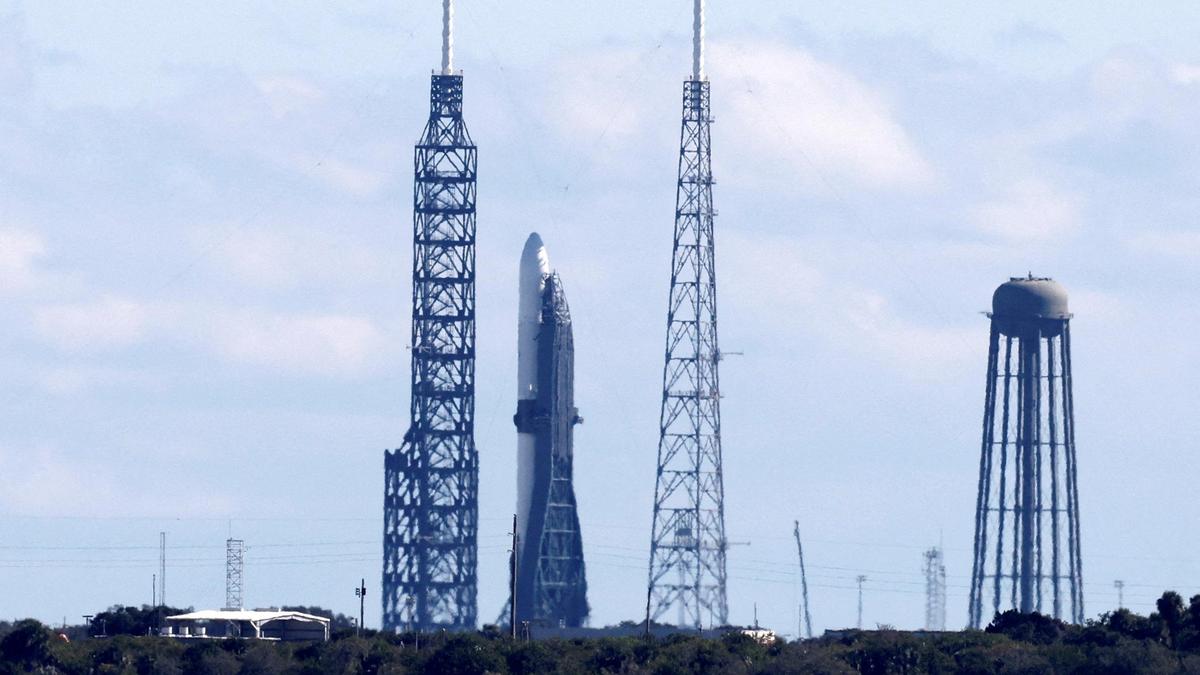Science
Geomagnetic Storm Delays Blue Origin’s Launch of NASA Satellites

A geomagnetic storm caused by a significant outburst of solar radiation has led to the indefinite postponement of the launch of Blue Origin’s New Glenn rocket, which is carrying twin NASA satellites designed to study space weather on Mars. Originally scheduled for November 12, 2025, the launch has been delayed due to concerns about the potential impact of elevated solar activity on the EscaPADE spacecraft.
The New Glenn rocket, a two-stage, heavy-lift vehicle towering at 32 stories, was set to lift off from the U.S. Space Force Station in Cape Canaveral, Florida. This mission marks a notable milestone for Blue Origin, as it represents the first major science mission undertaken by the company for a paying customer. Furthermore, it would also be the first launch of any type since the inaugural New Glenn flight in January 2025.
NASA announced the postponement after the U.S. Space Weather Prediction Center issued alerts regarding a severe geomagnetic storm. The storm was triggered by a surge of high-energy charged particles from the sun, following large solar eruptions known as coronal mass ejections. Measurements indicated that the storm reached a G-4 level, classified as “severe,” just one step below the highest level of G-5, deemed “extreme.”
According to Blue Origin’s statement, “New Glenn is ready to launch. However, due to highly elevated solar activity and its potential effects on the EscaPADE spacecraft, NASA is postponing launch until space weather conditions improve.” The company is currently assessing opportunities to establish a new launch date.
The launch had initially been planned for November 9, but was scrubbed due to heavy cloud cover. Following the rescheduling, the geomagnetic storm forecasted to persist at severe levels has led to further delays. Geomagnetic storms are known to disrupt satellite communications and can increase atmospheric density, creating friction on spacecraft in low-Earth orbit. This phenomenon previously resulted in the loss of 40 Starlink satellites launched by SpaceX in February 2022.
The surge in solar activity has also produced stunning auroras across large areas of the United States. Reports indicated that the Northern Lights, or Aurora Borealis, were visible unusually far south, reaching states like Texas, Florida, and Alabama on the night of November 11. Another round of auroras was anticipated for November 12.
Ironically, the twin satellites, named Blue and Gold, are intended to study similar space weather phenomena on Mars. These spacecraft, part of the EscaPADE mission—short for Escape and Plasma Acceleration and Dynamics Explorers—are designed to orbit Mars and analyze how streams of charged solar particles interact with the planet’s weak magnetic field. This interaction has significant implications for understanding how Mars has lost much of its atmosphere over billions of years.
Both NASA and Blue Origin are closely monitoring space weather conditions to determine a suitable launch window in the near future. As the situation develops, updates will be provided regarding the rescheduling of this important mission to explore Mars’ atmospheric dynamics.
-

 World4 months ago
World4 months agoSBI Announces QIP Floor Price at ₹811.05 Per Share
-

 Lifestyle4 months ago
Lifestyle4 months agoCept Unveils ₹3.1 Crore Urban Mobility Plan for Sustainable Growth
-

 Science4 months ago
Science4 months agoNew Blood Group Discovered in South Indian Woman at Rotary Centre
-

 World4 months ago
World4 months agoTorrential Rains Cause Flash Flooding in New York and New Jersey
-

 Sports4 months ago
Sports4 months agoBroad Advocates for Bowling Change Ahead of Final Test Against India
-

 Top Stories4 months ago
Top Stories4 months agoKonkani Cultural Organisation to Host Pearl Jubilee in Abu Dhabi
-

 Science4 months ago
Science4 months agoNothing Headphone 1 Review: A Bold Contender in Audio Design
-

 Top Stories4 months ago
Top Stories4 months agoAir India Crash Investigation Highlights Boeing Fuel Switch Concerns
-

 Sports4 months ago
Sports4 months agoCristian Totti Retires at 19: Pressure of Fame Takes Toll
-

 Business4 months ago
Business4 months agoIndian Stock Market Rebounds: Sensex and Nifty Rise After Four-Day Decline
-

 Politics4 months ago
Politics4 months agoAbandoned Doberman Finds New Home After Journey to Prague
-

 Top Stories4 months ago
Top Stories4 months agoPatna Bank Manager Abhishek Varun Found Dead in Well









